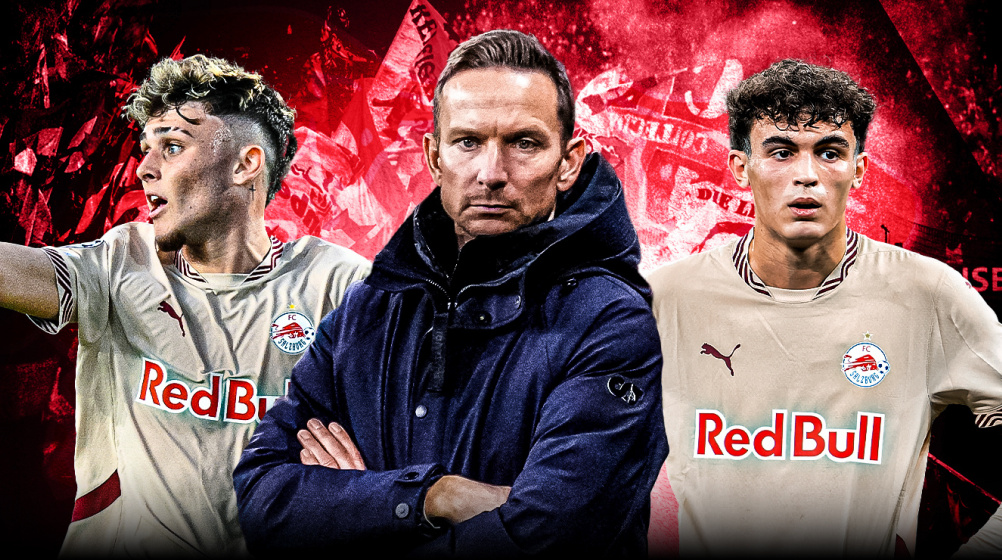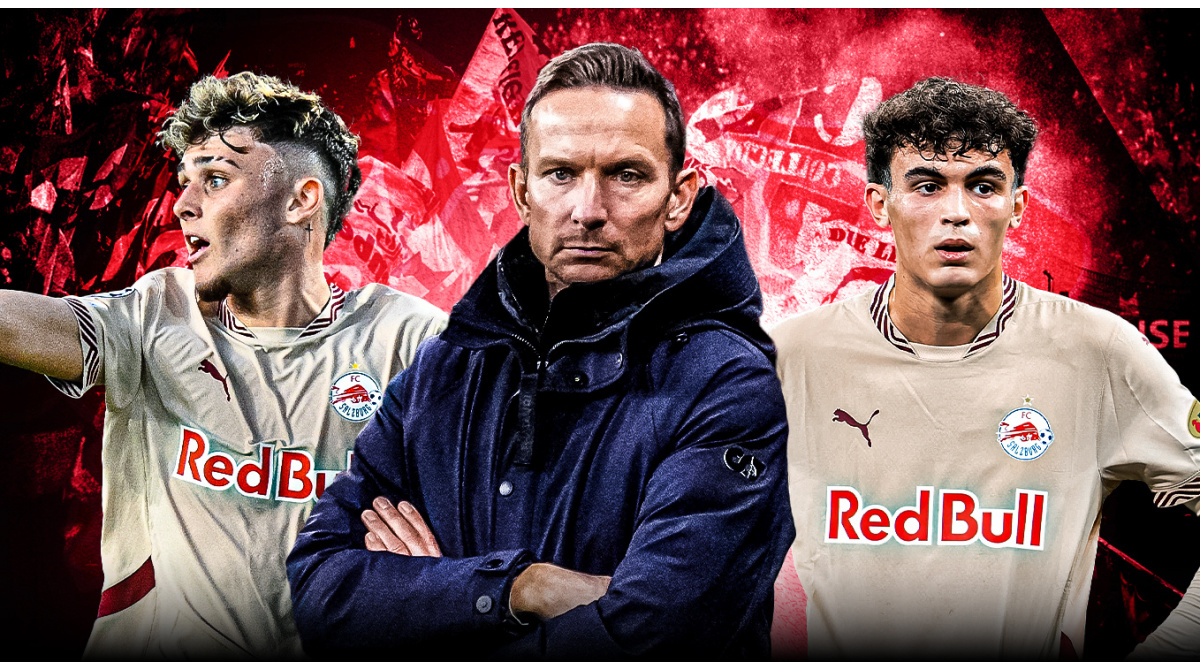Dropped to 6th

©TM/IMAGO
Red Bull Salzburg have had a poor start to the season. The Red Bulls sit in sixth place just above the cut-off line to the relegation round—the Austrian Bundesliga is split into a championship and relegation round after an initial double round-robin schedule. No matter the club, these circumstances would set off alarm bells. At RB Salzburg, the circumstances seem to be even more extraordinary—not just because of the gap in squad value compared with league leaders Sturm Graz but also because of Red Bull’s previous dominance over the league. Salzburg have undoubtedly lost their dominance over Austrian football over the last 18 months. So what is behind the decline of Austria’s powerhouse?
This year, Salzburg failed to maintain the Austrian league title—after ten back-to-back triumphs since 2014. In 2023, Salzburg lost out on the ÖFB-Cup, which went to Sturm Graz instead. Then, after the 2023/24 season, Sturm Graz won the league and the cup, becoming Salzburg’s new bogey team. This year, Sturm are 14 points ahead of Salzburg—although the Red Bulls have two games in hand. But even if the Red Bulls win their two outstanding games against Hartberg and Klagenfurt, the team with the eleven most valuable players in the Bundesliga would still only be fourth behind Sturm and the two Vienna-based clubs, Rapid and Austria.
“You could tell the decline at Salzburg was coming after the 2022/23 season,” Transfermarkt Area Manager Austria Dorian Schuster said. “That year, the club won the title without much resistance under head coach Matthias Jaissle, and despite losing to Sturm, the team from Graz never truly had a chance. That game against Graz was the only time the Red Bulls would lose a game in the league. In the ÖFB-Cup, too, Salzburg lost to Sturm in the quarterfinals and, for the first time in four years, failed to win the double. It was considered a significant setback.”
Problems in Salzburg: Wrong appointments and poor transfers
“Internally, things were more harmonised under Jesse Marsch or Marco Rose,” Schuster said. Then, in July 2023, Matthias Jaissle was fired. “One day before the first league match of the season against Altach, he all of a sudden wanted to start negotiations with Al-Ahli,” Schuster said when asked about the sudden exit of the German head coach, who would end up leaving for Saudi Arabia. Sporting director Christoph Freund also left the club to join Bayern Munich and Red Bull Salzburg started the 2023/24 season with a new leadership group in charge. Gerhard Struber was appointed the new head coach, and Freund was replaced by Bernard Seonbuchner, who had previously worked at the Red Bull feeder club in Liefering.
“Both appointments turned out to be a disaster,” Schuster said. “Struber’s tactics were not only not compatible with Champions League football, they also struggled against smaller teams.” After another early cup exit against Sturm and a defeat to minnows LASK, Struber was fired and replaced by national team assistant coach Onur Cinel, who was simultaneously also in charge of Liefering. But he, too, couldn’t change the direction of the club. Under his leadership, Salzburg lost 4-3 in Klagenfurt, which turned out to be a turning point in the title race. Or rather, the title was gone. Salzburg wouldn’t win a single trophy for the first time since the 2012/13 season.
After signing Jürgen Klopp’s former assistant, Pepijn Lijnders, the club hoped for improvement, but then the summer transfer window turned out badly. “After Freund’s transfer to Bayern, Seonbuchner had to work on his own, and the transfers he conducted didn’t strengthen the team,” Schuster said. “Serbian star defender Strahinja Pavlović was sold to AC Milan without signing a replacement. Instead, the club hoped Kamil Piatkowski, who returned from a disappointing loan spell at Granada, could fill the void.”
On top of that, two new signings from Liverpool threatened the squad chemistry. “Despite lacking match fitness, Bobby Clark, who followed Lijnders to Salzburg in a deal worth €11.8m, and Stefan Bajcetic, who is on loan from Liverpool, were given playing time ahead of already established stars and struggled in the club’s Champions League defeat to Sparta Prague (0-3),” Schuster said. “Then there was the controversy in goal. Former no.1 Alexander Schlager lost his place after returning from an injury to Janis Blaswich, who arrived on loan from sister club Leipzig and was made captain.” Schuster described it as a fiasco. “Blaswich hasn’t been good enough for Salzburg and ended up sitting on the bench.”
It hasn’t been much better in the Champions League, either. After the initial defeat to Sparta, Salzburg lost 4-0 to Stade Brest, 2-0 to Dinamo Zagreb, and then were smashed 5-0 by Bayer Leverkusen. The first three teams have a much smaller squad value than the Red Bulls. “You have to credit Lijnders for how the club qualified for the Champions League,” Schuster said. “The results in the league, however, are what has been most worrying. Salzburg lost 5-0 to champions Sturm, only managing a 0-0 draw against second-to-bottom WSG and relegation threatened GAK, and then lost to both Linz-based clubs.”
“Lijnders seems out of sorts,” Schuster said. “Salzburg lack leadership in the squad, and that’s Seonbuchner’s fault. Older stars like Andreas Ulmer had to leave this summer, and the oldest player on the squad is now Nicolás Capaldo at 26.” Schuster added: “The Red Bulls are struggling both in the boardroom and on the pitch. Replacing Lijnders and Seonbuchner and a complete restart seems inevitable. The squad is poorly put together; it is a mixture of talented but demotivated Freund signings combined with Lijnders and Seonbuchner signing players based on their connections. The goal must be to secure a position in the top six and avoid playing in the relegation rounds.” At the moment, Salzburg are just one point above the cutoff line.
